Who was Sir Oswald Mosley?
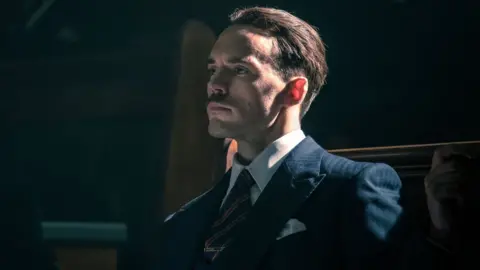 BBC
BBCLast night fans of Peaky Blinders met the gangster drama's latest villain - a fictionalised version of British fascist leader Sir Oswald Mosley. He was the one with big 'tache, who pulled aside gangland-boss-turned-MP Tommy Shelby and told him, ominously, "You have come to my attention."
He gave me the creeps. Adrien Brody was pretty menacing as the bad guy in the last series. But this fella...
He frightened lots of people in real life too.
During the 1930s Mosley led Britain's virulently anti-Semitic fascist movement, whose streetfighters - known as blackshirts - were notorious for their violence against Jews and left-wing opponents. He was on friendly terms with Mussolini. And Hitler was guest of honour at his second wedding.
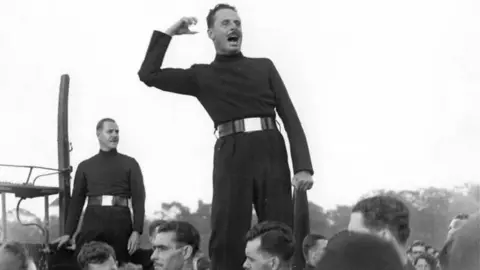 Getty Images
Getty ImagesOh, and that wedding took place at the home of Nazi Propaganda Minister Joseph Goebbels.
And here was me thinking razor-wielding Brummie gangsters were terrifying.
The British authorities definitely considered Mosley a threat. During World War Two he was interned as a suspected enemy sympathiser. It was widely assumed at the time that, had the Nazis successfully invaded the UK, he would have been installed as head of a pro-German puppet regime.
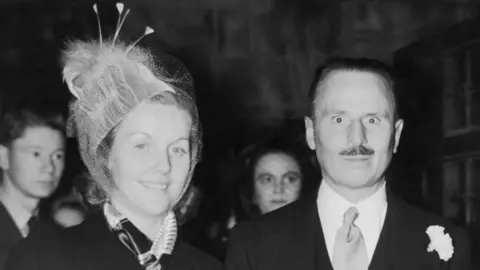 Getty Images
Getty ImagesEveryone knows about German Nazis and Italian fascists. British fascists... not so much. What kind of background did he come from?
"In the 20s he was a fashionable figure," says Stephen Dorril, Mosley's biographer. Born into an aristocratic family, Mosley was a champion fencer who distinguished himself during World War One and was elected Conservative MP for Harrow at the age of 21. He married the daughter of an earl. "He was invited to lots of parties. He knew Churchill, he knew all the politicians. A massive womaniser - he was very tall for the time, although he had a limp. He lived life to the full," says Dorril.
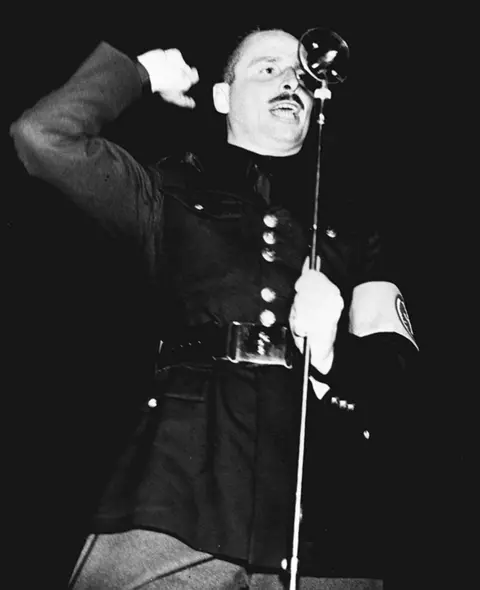 PA Media
PA Media
So he started out as a Tory. How did he end up so much further to the right?
Actually, after leaving the Conservatives he became a Labour politician - the MP for Smethwick, in Tommy Shelby's West Midlands stamping ground. Following the 1929 crash he became a government minister tasked with finding ways to solve the unemployment problem, but his proposals were rejected. Mosley couldn't accept this, says Dorril. "He was incredibly egotistical. He believed he was the right man. He believed that he had the solution." That's when he set up the New Party, which held meetings stewarded by heavies known as the "biff boys". Then, after touring Mussolini's Italy, Mosley formed the British Union of Fascists (BUF) in 1932, blending his economic programme with explicit anti-Semitism.
And this was actually popular… in the UK?
He achieved some limited success, for a time. At one point the BUF claimed 50,000 members. The Daily Mail's owner, Viscount Rothermere, notoriously wrote a 1934 article headlined "Hurrah for the blackshirts!" The BUF also got a handful of councillors elected.
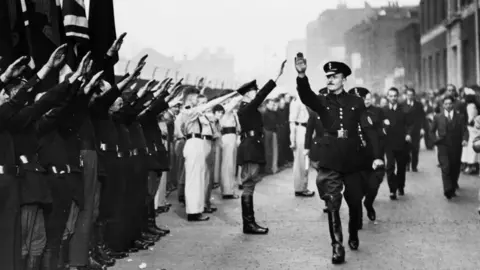 Getty Images
Getty ImagesYou said the blackshirts were violent towards Jewish people. What did they do?
There was a 1934 rally at London's Olympia, in which they brutally attacked hecklers in the crowd - left-wingers as well as Jews. Mosley also attempted to stage a march through a Jewish area of east London, resulting in the famous "Battle of Cable Street", in which local people and anti-fascists blocked the blackshirts' path. Although the BUF's membership actually rose in the wake of Cable Street, Dorril says that in general "the British don't like people parading around in uniform". In fact, the Public Order Act of 1936 included a ban on political uniforms.
The war must have put an end to his political career…
Pretty much. Most British people thought of WW2 as a war against fascism, and Mosley's internment met with little opposition. After the war, he attempted to revive his party - soon renamed the Union Movement - with little success, and he left the country in 1951. Eight years later, in the wake of race riots in Notting Hill, he stood for election in Kensington North on an anti-immigration platform, but failed to break through. After failing again in the 1966 general election, also in a London constituency, he retired to France. He died in 1980.
So, does he have any relevance today? Other than appearing in Peaky Blinders?
Dorril thinks Mosley would have welcomed the recent surge in populism, but he wouldn't have approved of Brexit: "He would have been appalled about Britain leaving Europe," he says. After WW2, Mosley began promoting the idea of "Europe, a nation". Mosley shows that the far-right has in the past had a certain appeal in the UK - but his biographer says Mosley was never in danger of securing power: "It's clear he was an exceptional speaker, but it never translated into a real mass movement. I think he was always doomed to failure, fortunately."
You may also be interested in:
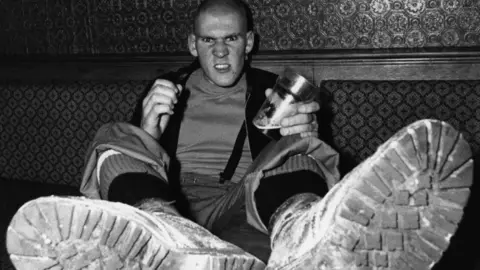 Getty Images
Getty ImagesHe was a skinhead and the poster boy for one of the 1980s' most notorious far-right movements. But Nicky Crane was secretly gay. Then his precarious dual existence fell dramatically apart.
